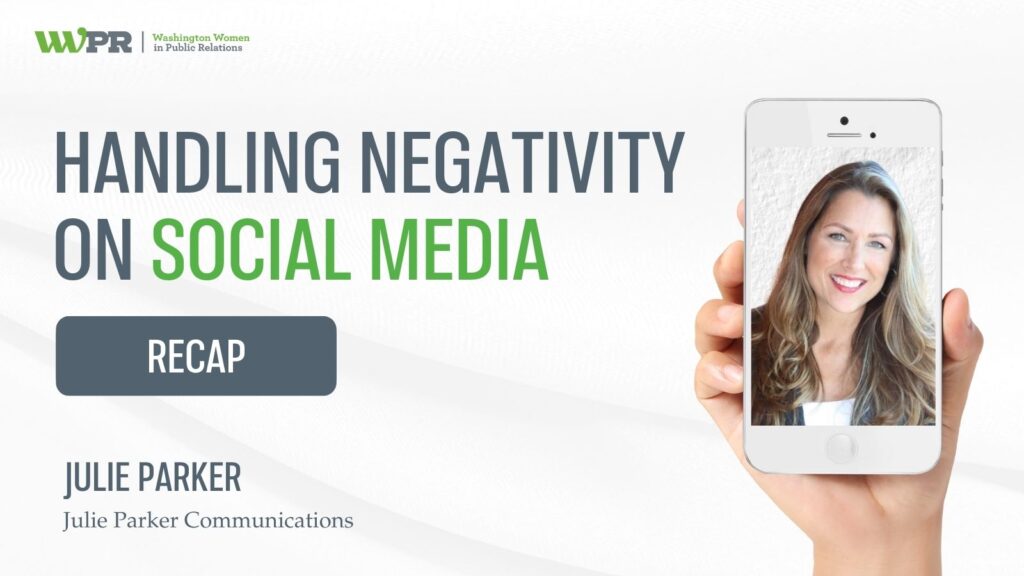Handling Negativity on Social Media Event Recap
Crisis communications guru Julie Parker took the WWPR events virtual stage at the end of last month to share her advice on effectively responding to negative remarks on social media. Julie is the founder of Julie Parker Communications, with her background including serving as an Emmy and Edward R. Murrow award-winning television reporter, the chief spokesperson and director of media relations for two of the nation’s largest police departments, and a subject matter expert on crisis communications, social media and media relations for the Naval Postgraduate School’s Center for Homeland Defense and Security. Needless to say, Julie’s expertise in crisis communications offered the WWPR audiences valuable steps fanning even the biggest social media flames.
Don’t Diminish the Emotions
Julie shared examples of how she has seen a lot of negativity across social media within her police force background. Handling negativity on social media can take an emotional toll. Julie’s advice: acknowledge that and don’t diminish those emotions.
Recognize the Audience and Social Media Landscape
A thing to keep in mind when reading unfavorable social media responses is that it is often the minority opinion’s voice that is the loudest and can carry the most trauma. Good work is hardly publicly recognized.
Being Timely is Everything
People increasingly want and expect answers on social media. Within the last six months alone, Julie shared that 50% of consumers increased their social media usage. 40% expect a response within the hour and 79% expect a response within 24 hours. There is nothing worse than a response that comes too late. When you see negativity and no response, that becomes your brand and narrative. Julie advised to use social media as a customer service relationship tool with the public to enhance the brand and have maximum control.
Types of Negativity
A variety of comments can appear, and it’s important to distinguish the difference between them. This will assess your team’s strategy on how to respond. General negative comments are those that are negative in no response to a particular incident but are more so negative just for the sake of being negative. Others include arguments about specific rules or laws, and comments in response to a negative event or crisis. Engaging with people angry about laws or rules or anything out of your control are futile and can lead to more negativity.
What to Do When Negative Comments Happen
Julie provided a series of steps to take when negative comments happen, even before determining how to respond. Rescheduling any scheduled posts to later, searching Google and social media to see what people are saying, and avoiding any deletion of negative comments or blocking users stand as a solid foundation for an effective crisis response.
How to Respond When Response Is Required
Now that your team determines a response is needed, a few steps to keep in mind will help shape your response to be most effective.
- Run your draft response through your attorneys and to others for different perspectives.
- Ignore comments that don’t have the intent of having a thoughtful discussion, which are mostly hateful or angry and won’t lead to a resolution.
- Respond to comments that start a dialogue to help understand why something happened or how it can be prevented to show you are listening.
- Avoid overpromising. It is okay to give people an update, but avoid putting out false information to avoid serious negative backlash.
- Be careful about your tone. The way you express your statement matters in how it is received.
- It is okay to address people directly and privately. Restating their name can be disarming, and private messages can demonstrate that your brand cares and is addressing the issue.
The Aftermath
So there was a crisis, but the good news is that social media moves quickly and that it is rare for anything to trend for long. The bad news: it is hard to know exactly when you can get back to business. Posting again also requires strategy, including having a neutral-toned post after your incident is over. An overly-happy post can be negatively received. Posts that are in response to the incident should be solution-oriented rather than apologetic. Once your social media is back into the swing of things, engaging posts can bring back positive interaction with your community.
If you are a member and would like to access the webinar recording that includes much more information, please email WWPR’s Professional Development Chairs to request access and for any other questions you may have: professionaldevelopment@wwpr.org
